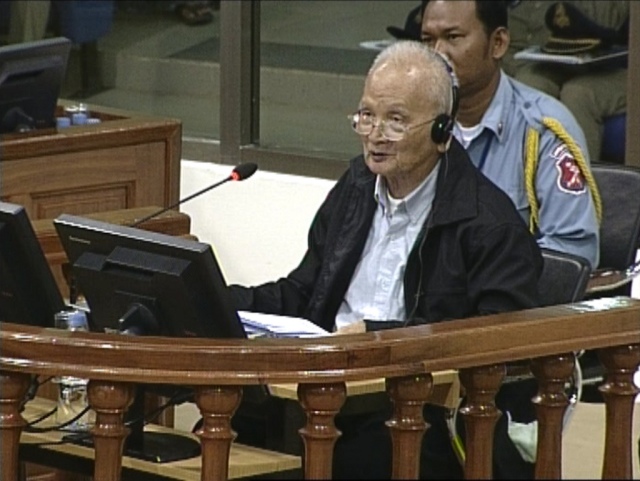
Wednesday, 23 November 2011
Bridget Di Certo
The Phnom Penh Post
In a rambling two-hour history lesson as told from the viewpoint of the Khmer Rouge, “Brother Number 2″ Nuon Chea portrayed himself as a defender of the Cambodian nation yesterday, telling the court that the actions of he and other regime leaders had been to protect the country from annihilation by Vietnam.
“I have been waiting for this opportunity for a long time,” Nuon Chea told the tribunal, adding that he wanted “to give the facts to my beloved Cambodian people about what happened”. The former Khmer Rouge leader – who stands accused of crimes against humanity and genocide – spent the next two hours reading from a prepared statement that explained away prosecutors’ allegations regarding the regime’s forced migration of urban population centres, the subject of the first in a number of mini trials that will comprise Case 002.
An Unorthdox Defense
Nuon Chea launched his defence by alleging Vietnam had tried to occupy Cambodia and exterminate the Khmer race over an 80-year period, beginning with the formation of the communist parties of Indochina in 1930. “From the beginning, the Vietnamese employed every trick available to destroy the Khmer people,” he said. “Vietnam has ideals of invasion, expansion, land-grabbing and racial extermination.”
To this day, Vietnam continues to plant illegal immigrants in Cambodia, he added, saying that the Kingdom’s neighbour is trying to “swallow” it, “suffocating it like a python would a deer”.
“The Vietnamese factor is the main factor that caused confusion in Democratic Kampuchea from 1975 to 1979 [the period of the Khmer Rouge regime],” he said.
It was a less-than-traditional way to begin a legal case, said Anne Heindel of the Documentation Center of Cambodia.
“It is a fascinating view of history … but a lot of the public will simply not understand or remember what he is talking about,” she said.
Placing Blame
The Trial Chamber has split Case 002 into a series of mini trials, with the first limited to forced movements of the population from urban areas in 1975 as well as some of the policies and organisational framework of the Communist Party of Kampuchea, or Khmer Rouge.
Because Case 002 has been split this way, the first trial will inevitably involve a great deal of examination of historical politics, much more so than future trials concerning forced marriage, interrogation or execution centres, Heindel told the Post.
“It appears we are going to hear arguments that it was all the fault of the lower levels, and ‘we had no control’,” Heindel said in reference to Nuon Chea’s claim that much of the Khmer Rouge cadre was polluted by bad elements – drunken, gambling, unemployed “vagabonds”.
Nuon Chea’s detailed statement, concerning the history of communism in Indochina and how the Khmer Rouge was effectively forced into action by Vietnamese “aggression”, appeared to comprise the bulk of his explanation for the brutal policies of the Khmer Rouge.
He intimately detailed a tranche of political meetings and correspondence within the communist party in Cambodia and between them and their Vietnamese counterparts, pointing to the political tensions at the time between Cambodia, Vietnam and the US as effectively forcing the hand of the senior leaders of the Khmer Rouge.
The accused rounded out his speech by pointing to Vietnam’s “illegal invasion” of Cambodia in January 1979 – an invasion that effectively spelled the end of the Khmer Rouge regime – and pointed to modern day examples he said proved Vietnam was still trying to “conquer” the Kingdom.
Complexity in the Court
Nuon Chea – and fellow defendants Ieng Sary and Khieu Samphan – will only have to answer to a narrow set of charges during the first mini trial, which does not include other criminal charges related to execution sites, forced labour or forced marriage and genocide.
Noun Chea’s defence attorney Michiel Pestman said that this decision by the tribunal has made what are already complex proceedings bewildering for both victims and the media.
“The public is left with the impression that all of the charges would be discussed at this trial, but that is not the case – this first trial is very limited,” Pestman said.
Despite the limited charges at play in the first trial, the co-prosecutors spent the first day and a half of opening statements delivering a graphic outline of the brutality and horror of the Khmer Rouge regime.
In his concluding remarks, British prosecutor Andrew Cayley said that from Geneva to Pyongyang, the three elderly co-accused had bragged about the bloody slaughter of hundreds of thousands of Cambodians and defended their actions to the international community.
“[The accused] are common murderers of an entire generation of Cambodians,” Cayley concluded. “They robbed decades of development and prosperity, left gaping holes in every family – nothing is left unhurt or unaffected by what these three elderly men have done.”

No comments:
Post a Comment